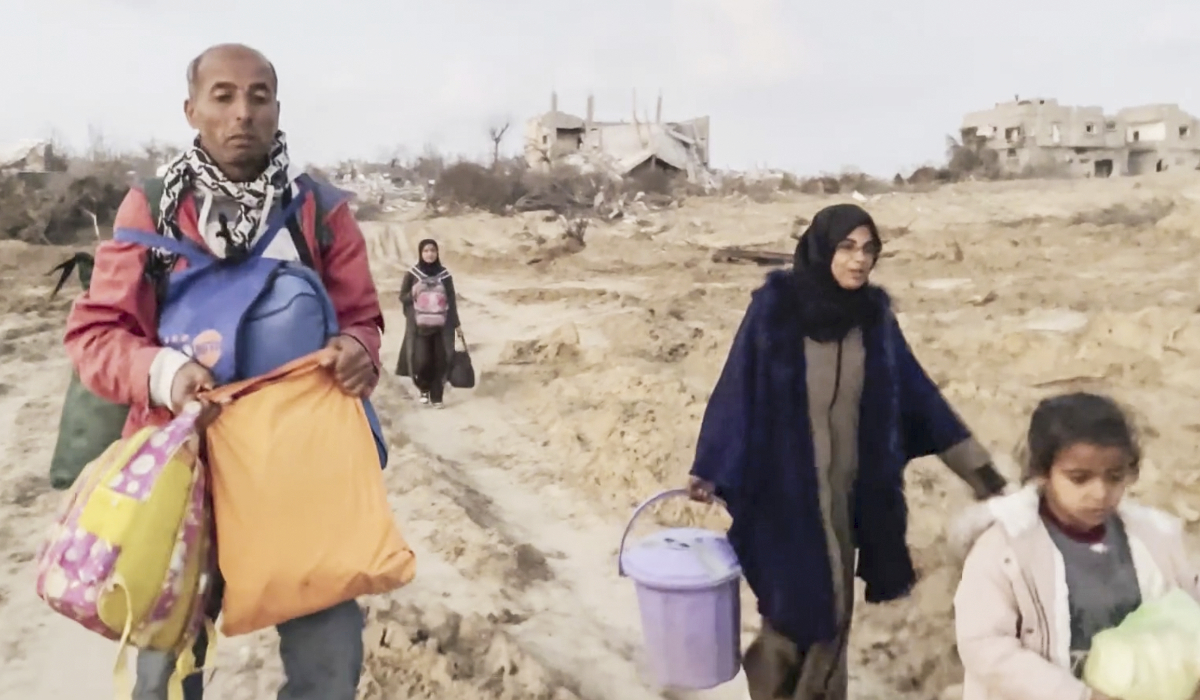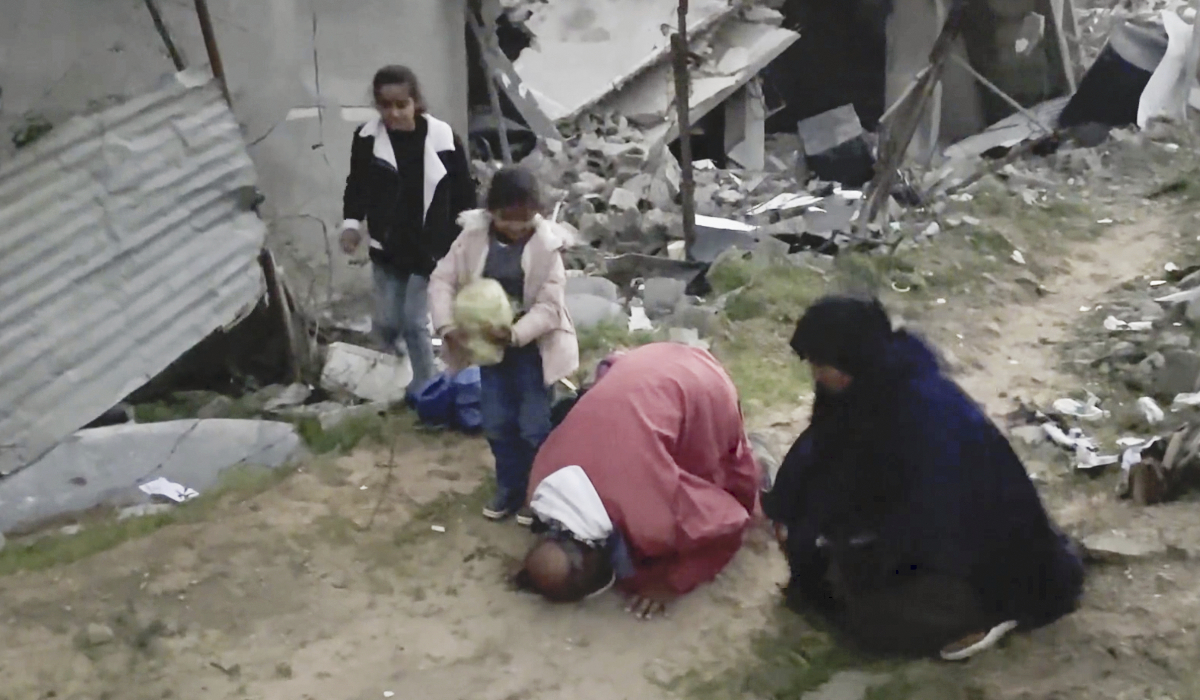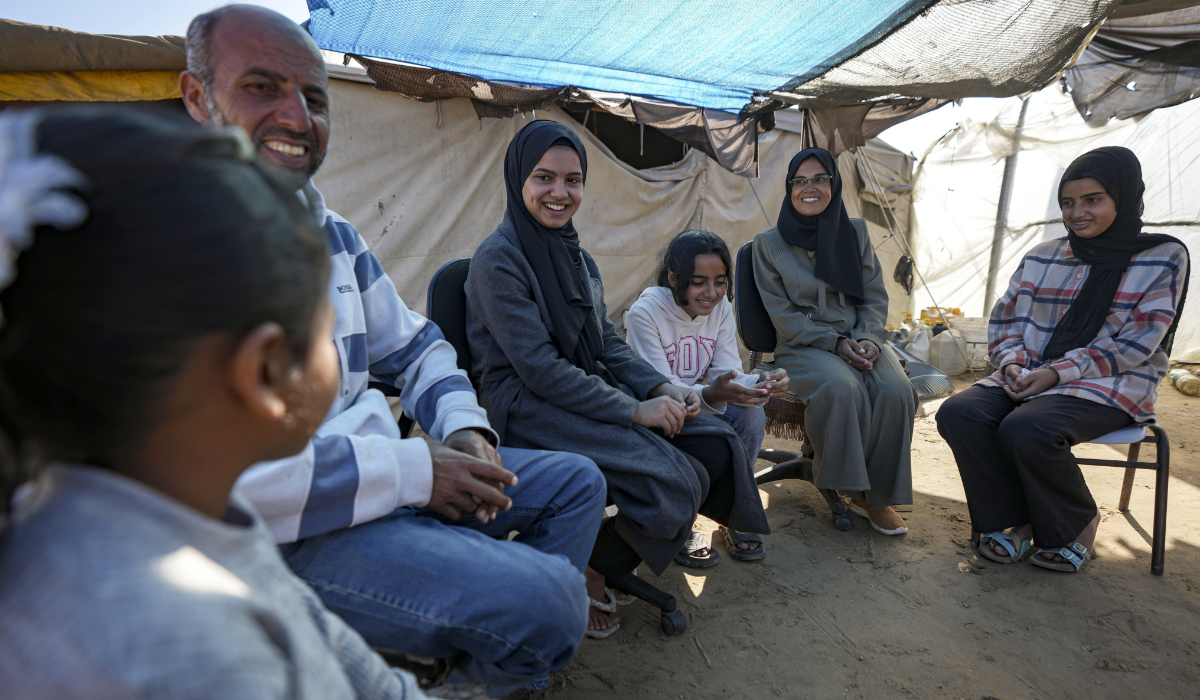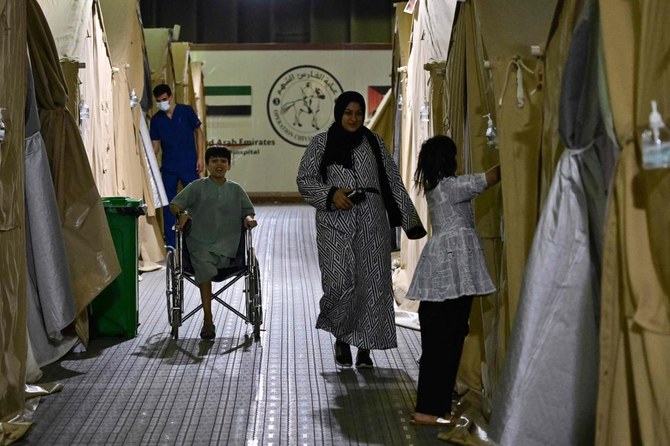AL-ARISH, Egypt: On a floating hospital near Gaza, doctors aren’t just treating physical wounds — they’re providing emotional support too for children and adults haunted by months of terrifying war.
Child amputees and elderly people in wheelchairs are among the patients on the converted ship off Arish, northern Egypt, funded and operated by the United Arab Emirates.
About 2,400 people have been treated at the temporary facility, whose rows of tents below deck hold about 100 patients at a time, says deputy medical director Abdullah Al-Zahmi.
If that only scratches the surface of the needs of Gaza, it reflects the difficulty of providing aid for the sealed and bombarded territory.
More than 38,000 Palestinians, mostly civilians, have been killed in Gaza since the Israel-Hamas war broke out nearly nine months ago, according to the health ministry in the Hamas-run territory.
The war was sparked by Hamas’s October 7 attack on southern Israel that resulted in the deaths of 1,195 people, also mostly civilians, according to an AFP tally based on official Israeli figures.
Nine-year-old Yazan is one of those traumatized by the war, after being brought to the hospital about 40 kilometers (25 miles) from Gaza without his parents and having a leg amputated because of his wounds.
Zahmi jokes with the boy, asks how his parents are doing in Gaza and assures him he will soon have a prosthetic leg fitted.
“The traditional relationship between the patient and the doctor” has dissolved, the doctor tells AFP.
“Every day we see each other, we speak comfortably, and we care about their needs, problems, and psychological pain.”
Yazan’s parents were not allowed to accompany him through the Rafah crossing into Egypt, Zahmi says, without giving further details. The route was closed by Israeli forces in early May.
The boy’s condition “was initially a concern for us, as dealing with him was difficult because he was emotional and in need of his mother and father.”
“But as days passed, we began to include Yazan as one of our family... and now he has become an icon for us because of his clinging to life, his constant smile, and everyone’s love for him,” Zahmi says.
The child is undergoing psychological and social rehabilitation and communicates daily with his family, Zahmi adds.
Smiling as he sits inside one of the tents, Yazan shows the doctor a picture of him with his father before the outbreak of war last October.
After his artificial leg is fitted, Yazan says he wants to “walk and play football,” adding that his “favorite player is (Cristiano) Ronaldo.”
“I would like to return to Gaza and live with my father and mother,” he says.
Zahmi says more than 840 operations have been carried out at the hospital, which has a surgical department, an intensive care and anaesthesia unit, X-ray facilities, a pharmacy and laboratory.
Its 60 staff span specialities including orthopaedics, internal care, neurosurgery and dentistry.
The hospital also provides communal spaces and communications with relatives in Gaza or elsewhere, Zahmi says.
“We provide them with high-speed Internet, outdoor areas for playing and resting, and a place for prayer,” he says.
In the main loading area of the 200-meter ship, ambulances are preparing to transfer patients to a plane to the UAE, where they will receive further treatment.
According to Zahmi, they are among those chosen as part of a UAE initiative to receive 1,000 wounded children and 1,000 cancer-sufferers from the Gaza Strip.
Other patients discharged from the hospital are taken to housing designated for them by Egyptian authorities.
For any patients who need further treatment but who are not being flown to the UAE, the Emirates Red Crescent will cover their costs at an Egyptian hospital.
Fadia Al-Madhun, 44, is on the floating hospital with her husband, who was injured in a bombing that targeted their Gaza home.
“We left the house. It was bombed. We did not take clothes or anything else,” says Madhun, wearing a floral hijab.
“They gave us everything (including) psychological support for our children,” she adds.
Zahmi says the hospital staff have seen “many families who lost their children and people who lost their fathers and mothers, and therefore we understand the tragedies.”
“We listen a lot and try to accept, but in the end, no matter how much we console them, the wound runs deep and remains in the memory,” he adds.
Psychological wounds hard to heal for Gaza war victims
https://arab.news/vsuvb
Psychological wounds hard to heal for Gaza war victims

- Child amputees and elderly people in wheelchairs are among the patients on the converted ship off Al-Arish funded and operated by the UAE
- If that only scratches the surface of the needs of Gaza, it reflects the difficulty of providing aid for the sealed and bombarded territory
This is what one family in Gaza returned home to after 15 months of war

- Since Monday, more than 375,000 Palestinians have made their way back to northern Gaza, many of them on foot
- Over 15 months, Israel launched repeated offensives in Gaza City and surrounding areas, trying to crush Hamas fighters who often operated in densely populated neighborhoods
BEIT LAHIYA, Gaza Strip: The grove of orange, olive and palm trees that once stood in front of Ne’man Abu Jarad’s house was bulldozed away. The roses and jasmine flowers on the roof and in the garden, which he lovingly watered so his family could enjoy their fragrance, were also gone.
The house itself was a damaged, hollowed-out shell. But after 15 months of brutal war, it stood.
At the sight of it Monday, Ne’man; his wife, Majida; and three of their six daughters dropped the bags they had been lugging since dawn, fell to their knees and prayed, whispering, “Praise be to God, praise be to God.” The sunset blazed orange in the sky above.

After 477 days of hell — fleeing the length of the Gaza Strip, hiding from bombardment, sweltering in tents, scrounging for food and water, losing their possessions – they had finally returned home.
“Our joy is unmatched by any other, not the joy of success, of a marriage or of a birth,” Majida said. “This is a joy that can’t be described in words, in writing or in any expression.”
In October, at the one-year anniversary of the Gaza war, The Associated Press traced the Abu Jarad family’s flight around the territory seeking safety. They were eight of the roughly 1.8 million Palestinians driven from their homes by Israel’s massive campaign of retaliation against Hamas following the militants’ Oct. 7, 2023, attack on southern Israel.

Like many families, they were displaced multiple times. Ne’man, Majida and their daughters – the youngest in first grade, the oldest in her early 20s – fled their home at the northernmost part of Gaza hours after Israeli bombardment began. They would move seven times in total, fleeing all the way to Gaza’s southernmost city Rafah.
Each time, their conditions worsened. By October 2024, they were languishing in a sprawling tent camp near the southern city of Khan Younis, exhausted and depressed, with little hope of seeing home again.
Hope suddenly revived when Israel and Hamas reached a long-awaited ceasefire earlier this month. On Jan. 19, the first day of the truce, Majida began packing up their clothes, food and other belongings. On Sunday, the announcement came: The next day, Israeli troops would pull back from two main roads, allowing Palestinians to return to the north.

Since Monday, more than 375,000 Palestinians have made their way back to northern Gaza, many of them on foot.
The Abu Jarads set off Monday from their tent at 5 a.m., loading bags stuffed with their belongings into a car. The driver took them to the edge of the Netzarim Corridor, the swath of land across Gaza that Israeli forces had turned into a military zone that – until this week – had barred any returns north.
There, they got out and walked, joining the massive crowds making their way down the coastal road. For around 8 kilometers (5 miles), the 49-year-old Ne’eman carried one sack on his back, held another in his arms, and two bags dangled from the crooks of his elbows. They stopped frequently, to rest, rearrange bags, and drop items along the way.
“The road is really hard,” Majida told an AP journalist who accompanied them on the journey. “But our joy for the return makes us forget we’re tired. Every meter we walk, our joy gives us strength to continue.”
Reaching the southern outskirts of Gaza City, they hired a van. But it quickly ran out of fuel, and they waited more than an hour before they found another one. Driving through the city, they got their first look at the war’s devastating impact in the north.
Over 15 months, Israel launched repeated offensives in Gaza City and surrounding areas, trying to crush Hamas fighters who often operated in densely populated neighborhoods. After each assault, militants would regroup, and a new assault would follow.
The van made its way down city streets strewn with rubble, lined with buildings that were damaged husks or had been reduced to piles of concrete.
“They destroyed even more in this area,” Ne’man said, staring out the window as they left Gaza City and entered the towns of Beit Lahiya and Beit Hanoun – scene of one of Israel’s most ferocious offensives in the last three months before the ceasefire.
As the sun began to set, the van dropped them off at the edge of their neighborhood. Ne’man’s daughters stood in shock. One gaped, her hands on her cheeks. Her sister pointed out at the field of flattened houses. They walked the last few hundred meters, over a landscape of rutted, bulldozed dirt.
Trudging as fast as he could under the bags draping from his body, Ne’man — a taxi driver before the war — repeated over and over in excitement, “God is great, God is great. To God is all thanks.”
Their home still stood, sort of — a hollow shell in a row of damaged buildings. After they prayed in front of it, Ne’eman leaned on the bare concrete wall of his house and kissed it. To his joy he discovered that one flowering vine in front of the house had miraculously survived. He immediately set about examining and arranging its tendrils.
One of the girls dashed in through the now doorless front entrance. “Oh Lord, oh Lord,” her gasps came from the darkness inside. Then she began to cry, as if all the shock, sorrow, happiness and relief were gushing out of her.
Like others streaming back into northern Gaza, the Abu Jarads will face the question of how to survive in the ruins of cities decimated by war. Water and food remain scarce, leaving the population still reliant on humanitarian aid, which is being ramped up under the ceasefire. There is no electricity. Tens of thousands are homeless.
Adjoining the Abu Jarads’ home, Ne’man’s brother’s three-story house is now a pile of concrete wreckage after it was destroyed by an airstrike. It damaged Ne’man’s home as it collapsed, “but, thank God, there is an undamaged room which we will live in,” he said. He vows to repair what is damaged.
Grief from the war lays heavily on him, Ne’man said. His uncle lost his home, and several of his uncle’s children were killed. Several of his neighbors’ homes were destroyed. Ne’man said he will have to walk several kilometers (miles) to find water, just like he did in the displacement camps.
“Once again, we will live through suffering and fatigue.”
Russia, Syria to hold further talks on Russian military bases in Syria, TASS reports

DAMASCUS: Russia and Syria will hold further talks regarding Russian military bases in Syria, Russia’s news agencies reported late on Tuesday, citing Russian Deputy Foreign Minister Mikhail Bogdanov as telling journalists after his talks with Syrian officials.
“This issue requires additional negotiations,” TASS news agency cited Bogdanov as saying. Bogdanov is heading Russia’s delegation to Damascus for the first time since Moscow’s ally President Bashar Assad was toppled.
He added that so far there have been no changes to the presence of Russian military bases in the country.
New backlash over Trump plan to move people out of Gaza

- “We emphasize that Jordan’s national security dictates that the Palestinians must remain on their land and that the Palestinian people must not be subjected to any kind of forced displacement whatsoever,” Jordanian’s spokesman Mohammad Momani said
- Israel has killed at least 47,317 people in Gaza, the majority civilians according to figures from the Hamas-run territory’s health ministry that the UN considers reliable
JERUSALEM: An idea floated by US President Donald Trump to move Gazans to Egypt or Jordan faced a renewed backlash Tuesday as hundreds of thousands of Gazans displaced by the Israel-Hamas war returned to their devastated neighborhoods.
A fragile ceasefire and hostage release deal took effect earlier this month, intended to end more than 15 months of war that began with Hamas’s October 7, 2023 attack on Israel.
After the ceasefire came into force, Trump touted a plan to “clean out” the Gaza Strip, reiterating the idea on Monday as he called for Palestinians to move to “safer” locations such as Egypt or Jordan.
The US president, who has repeatedly claimed credit for sealing the truce deal after months of fruitless negotiations, also said he would meet Israeli Prime Minister Benjamin Netanyahu in Washington “very soon.”
Jordan, which has a tumultuous history with Palestinian movements, on Tuesday renewed its rejection of Trump’s proposal.
“We emphasize that Jordan’s national security dictates that the Palestinians must remain on their land and that the Palestinian people must not be subjected to any kind of forced displacement whatsoever,” Jordanian government spokesman Mohammad Momani said.
Qatar, which played a leading role in the truce mediation, on Tuesday said that it often did not see “eye to eye” with its allies, including the United States.
“Our position has always been clear to the necessity of the Palestinian people receiving their rights, and that the two-state solution is the only path forward,” Qatar’s foreign ministry spokesman Majed Al-Ansari said.
Following reports that Trump had spoken with Egyptian President Abdel Fattah El-Sisi at the weekend, Cairo said there had been no such phone call.
“A senior official source denied what some media outlets reported about a phone call between the Egyptian and American presidents,” Egypt’s state information service said.
On Monday, Trump reportedly said the pair had spoken, saying of El-Sisi: “I wish he would take some (Palestinians).”
After Trump first floated the idea, Egypt rejected the forced displacement of Gazans, expressing its “continued support for the steadfastness of the Palestinian people on their land.”
France, another US ally, on Tuesday said any forced displacement of Gazans would be “unacceptable.”
It would also be a “destabilization factor (for) our close allies Egypt and Jordan,” a French foreign ministry spokesman said.
Moving Gaza’s 2.4 million people could be done “temporarily or could be long term,” Trump said on Saturday.
Israel’s far-right Finance Minister Bezalel Smotrich said he was working with the prime minister “to prepare an operational plan to ensure that President Trump’s vision is realized.”
Smotrich, who opposed the ceasefire deal, did not provide any details on the purported plan.
For Palestinians, any attempts to force them from Gaza would evoke dark memories of what the Arab world calls the “Nakba,” or catastrophe — the mass displacement of Palestinians during Israel’s creation in 1948.
“We say to Trump and the whole world: we will not leave Palestine or Gaza, no matter what happens,” said displaced Gazan Rashad Al-Naji.
Almost all of the Gaza Strip’s inhabitants were displaced at least once by the war that has levelled much of the Palestinian territory.
The ceasefire hinges on the release during a first phase of 33 Israeli hostages held in Gaza in exchange for around 1,900 Palestinians held in Israeli jails.
On Monday, Israeli government spokesman David Mencer said eight of the hostages due for release in the first phase are dead.
Since the truce began on January 19, seven Israeli women have been freed, as have about 290 Palestinians held in Israeli prisons.
On Monday, after Hamas and Israel agreed over the release of six hostages this week, “more than 300,000 displaced” Gazans were able to return to the north, according to the Hamas government media office.
“I’m happy to be back at my home,” said Saif Al-Din Qazaat, who returned to northern Gaza but had to sleep in a tent next to the ruins of his destroyed house.
“I kept a fire burning all night near the kids to keep them warm... (they) slept peacefully despite the cold, but we don’t have enough blankets,” the 41-year-old told AFP.
Hamas’s October 7 attack on Israel resulted in the deaths of 1,210 people, mostly civilians, according to an AFP tally based on official Israeli figures.
During the attack, militants took into Gaza 251 hostages. Eighty-seven remain in the territory, including dozens Israel says are dead.
Israel’s retaliatory offensive has killed at least 47,317 people in Gaza, the majority civilians, according to figures from the Hamas-run territory’s health ministry that the UN considers reliable.
“In terms of the death toll, yes, we do have confidence. But let’s not forget, the official death toll given by the Ministry of Health, is deaths accounted in morgues and in hospitals, so in official facilities,” World Health Organization spokesman Christian Lindmeier said Tuesday.
“As people go back to their houses, as they will start looking for their loved ones under the rubble, this casualty figure is expected to increase,” he added.
More than 376,000 return to north Gaza since Monday: UN

- OCHA: Over 376,000 people are estimated to have returned to their places of origin in northern Gaza
- “This is our homeland and we have to go back,” said one displaced woman, Ola Saleh
UNITED NATIONS: More than 376,000 Palestinians displaced by the war between Israel and Hamas have returned to northern Gaza, the UN’s humanitarian body OCHA said Tuesday.
“Over 376,000 people are estimated to have returned to their places of origin in northern Gaza, following the withdrawal of Israeli forces from the two main roads along the Netzarim corridor” that leads into the north, OCHA said in a humanitarian update.
Opinion
This section contains relevant reference points, placed in (Opinion field)
Many Palestinians said they were happy to return, even though their homes in northern Gaza are likely damaged or destroyed. Others said the feeling was bittersweet, as nearly everyone has friends or relatives killed by Israel during the 15-month war against Hamas.
“This is our homeland and we have to go back,” said one displaced woman, Ola Saleh.
The ceasefire is aimed at ending the war and releasing dozens of hostages and hundreds of Palestinians imprisoned or detained by Israel.
Paramilitary attacks displace thousands in North Darfur

PORT SUDAN: Thousands of families fled their homes in Sudan’s North Darfur state over two days, the UN’s migration agency said on Tuesday, amid intensified attacks by paramilitary forces.
“Between 25 and 27 January 2025, an estimated 3,960 households were displaced from various villages across El-Fasher locality,” the International Organization for Migration said.
The paramilitary Rapid Support Forces — at war with the army since April 2023 — have captured every state capital in the vast western region of Darfur except for North Darfur capital El-Fasher, which they have besieged since May.
In its latest attempt to capture the city, the RSF last week issued an ultimatum demanding that army forces and their allies leave the city.
The IOM said the displacement occurred due to RSF attacks, which included reported incidents of “looting and burning of personal property.”
Army and allied forces have repeatedly repelled attacks by the paramilitary forces, who local activists said launched intense artillery shelling on residential neighborhoods in the city.
On Friday, a drone attack on the city’s only functioning hospital, which local monitors blamed on the RSF, killed 70 people, drawing condemnation from the UN.
Nearly 1.7 million people are displaced in North Darfur state alone, according to the UN, with an estimated two million experiencing extreme food insecurity and 320,000 in famine.
In the area around El-Fasher, famine has already taken hold in three displacement camps — Zamzam, Abu Shouk and Al-Salam — and is expected to expand to five more areas including the city itself by May, according to a UN-backed assessment.




















